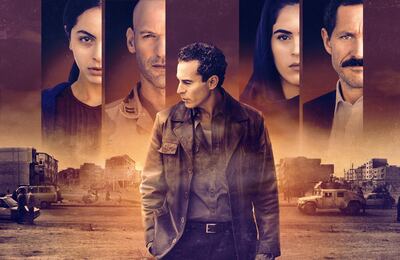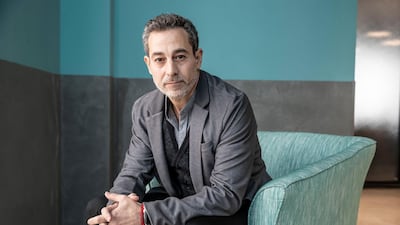Waleed Zuaiter was 19 and living in Kuwait when Saddam Hussein invaded the country in 1990. The Palestinian-American actor, his parents, cousins and 93-year-old grandmother fled the country in a convoy of three vehicles, crossing into Iraq before finally entering Jordan in a journey that lasted three days. The experience, Zuaiter says, signalled the start of his adulthood. "It gave me a sense of how disruptive war can be, how it can displace families and even a whole country."
It also lay the foundations of Zuaiter's role as Muhsin Khafaji, the central figure in the new noir drama Baghdad Central. The six-part series is due to be released in the UAE on Starzplay today, on Wednesday, February 12. It offers a fresh locally-rooted perspective of life in Baghdad following the US-led coalition's invasion of Iraq. The show is based on the debut crime novel by Elliott Colla and features Khafaji, the brooding, poetry-loving police inspector, as its main character.
“Khafaji is a reluctant hero,” Zuaiter says. “He is somebody who had lost everything [even before the events of the series began]. He lost his wife to cancer and the sanctions that kept her from seeking treatment. His oldest son was a dissident to Saddam’s government and was executed. He had already lost so much and was reluctant of risking more.”
In the series, the new regime is looking for those who had been working under the Saddam regime. As such, many former police officers have gone into hiding. Khafaji, initially, was one of them. “Khafaji would have liked nothing more than to remain in hiding and slowly wither away," adds Zuaiter.
But with one estranged daughter gone missing and another desperately needing medical attention, his character could not stay idle. He is forced to collaborate with the occupying forces. Amid a charged political situation, Khafaji is an anxious father who makes choices to save his daughters.
"He hears that his eldest daughter, Sawsan, is secretly working as a translator for the Americans and is determined to seek her out. His other daughter, Mrouj, is bedridden and needs kidney dialysis. It spurs Khafaji on his heroic journey. It reinvigorates his courage and fearlessness; the essence of his character."
Baghdad Central marks the first time Zuaiter has played the lead character in a production. He had previously held supporting roles in shows such as Netflix's The Spy and Altered Carbon. It was a steep learning curve, the actor says, which was terrifying at times.
"But my excitement overrode the fear," he says. "People kept coming up to me, saying, 'You realise everything relies on you, right?' and I didn't want to let the pressure get to me.' Bertie Carvel, the British-lead, and Corey Stoll, the American lead, said to me, 'You know how special this is, right?' I knew but to hear it from them was a beautiful thing. It was beautiful because they knew how special the show was. It was the first time in Western media where a drama was being told from the perspective of the Iraqis."

The series was shot in Morocco in 2018 and features a star-studded cast with roots in the Arab world. Producer of the show, Kate Harwood, says that they made a point to seek out some of the best talent from around the region. The cast features a number of Palestinian, Iraqi and British-Arab actors including July Namir, who plays Khafaji’s daughter Mrouj.
“Even those with relatively small roles are lead actors in their home countries,” Harwood says. “And that really shows, I think, when you cut to small pockets of stories and see some exceptional performances.”
Harwood says the female characters in the series were brought slightly more central than in the book.
“We looked at building a story that gave women more agency. There are a number of strong woman roles, such as Sawsan and the character of Professor Zubeida Rashid. What the screenwriter Stephen Butchard was interested in is what was swept away when Saddam was taken out of power. Such as a more secular, questioning, educating population and that is what Zubeida and her female students represent.”
Harwood also brought in Iraqi-born producer and filmmaker Arij Al Soltan to work on Baghdad Central, and because she had experienced the US invasion and occupation, she provided invaluable insight, as did Iraqi speech coach Abbas Abdulghani. In the series, the cast speak Arabic and English and the decision to have Khafaji speak English with his family works, giving viewers a sense of intimacy, while interactions in the city are in Arabic.
Iraq is still living through the devastating consequences of the US invasion. Anti-government protests continue in Baghdad and the population is still trying to establish its agency. Baghdad Central is not only timely, but an excellent reminder that on the ground, ordinary people with families are struggling to lead their lives.


